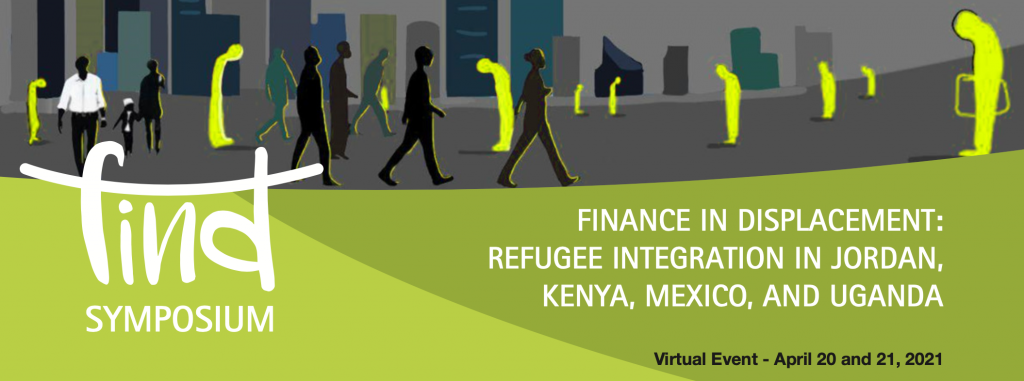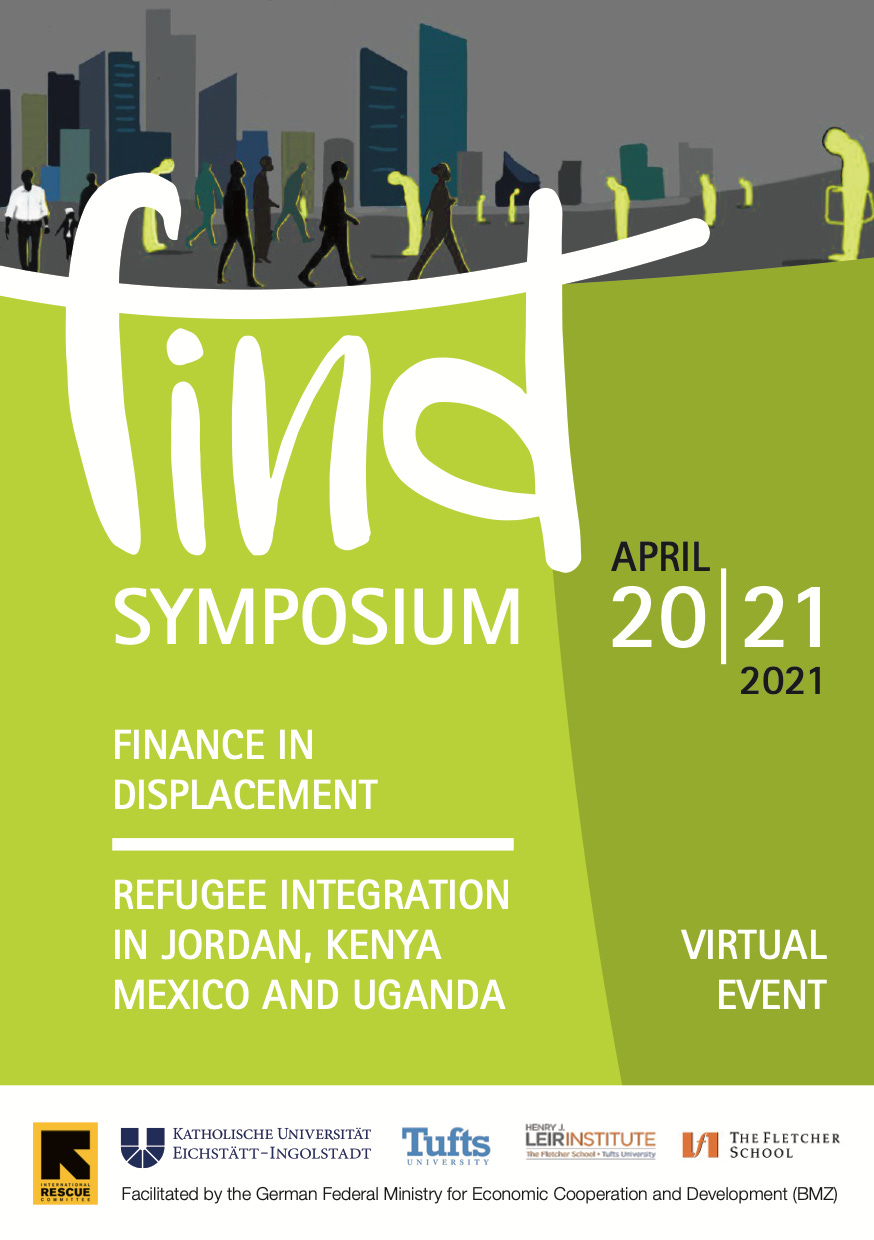
8 Months of Fresh FINDings
Looking ahead to our FIND Symposium, we reflect on some of our FINDings.
The Fresh FINDings Newsletter provides monthly insights into how refugees in Jordan and Kenya are adapting to their new economic and financial surroundings amidst displacement. Here’s a brief look into some updates from our field sites over the last eight months. Please visit the Journeys Project at Tufts University for more information on previous studies, ongoing research, videos, maps, and artwork on refugees and migrants in the Middle East, Africa, and North and South America.

Do not forget to register for our upcoming FIND Symposium on April 20th and 21st, from 8:00am EDT to 11:00am EDT.
Financial Journeys and COVID-19 (August 2020)
The COVID-19 pandemic is particularly disruptive for refugees’ economic livelihoods and the crisis underscores the need for financial inclusion efforts.
While examining the financial journeys of refugees and asylum-seekers in Jordan, we found that most respondents are stuck in a “survivelihood phase” and are experiencing difficulties in finding stable jobs and meeting the increased costs of living. Even for the minority of refugees that see a gradual increase in livelihoods, external shocks like the COVID-19 epidemic have caused financial setbacks. Similarly, for refugee respondents in Nairobi, who had achieved some economic self-sufficiency, COVID-19 caused their economic lives to plateau at livable income levels.
On top of the current pandemic, refugees continue to face legal barriers to employment, professional growth, and asset acquisition. Our research on how refugees in Jordan are managing their financial lives provides evidence that supports the International Rescue Committee’s report,which analyzes how policies in Jordan and Lebanon impact refugee livelihood opportunities. Investments in technology like digital financial services play a pivotal role in meeting the heightened need for financial inclusion efforts for vulnerable populations, especially as the COVID-19 crisis further constrains opportunities for refugees.
Click here to learn more about our FINDings and policy recommendations.
Bureaucracy and Identification (September 2020)
Legal and bureaucratic obstacles prevent refugees from accessing the work and financial services needed to build a full financial life in displacement.
Philip is a 38-year-old refugee who has lived in Kenya for ten years with his family of four. Despite collecting many different forms of documentation, including everything from refugee, travel, and other forms of ID to taxes, licenses, and work permits, he continues to face bureaucratic barriers that bar him from employment. Philip lost work as a French teacher and then as a ride-share driver because these jobs require additional documentation unavailable to refugees. These barriers force him to remain in the informal economy, a particularly vulnerable financial circumstance during the COVID-19 crisis. Still unable to return to his home in the DRC, Philip wonders if he can pursue permanent Kenyan status to escape the hindrances attached to his status as a refugee. However, few (if any) have achieved this designation.
Read more about Philip’s Story here.
Entrepreneurship Amidst Displacement (October 2020)
While balancing the challenges that come with refugee status, some “positive deviants” are able to leverage strategies that allow for livelihood progress amidst displacement.
An interesting aspect of our FINDings is the positive deviance in the financial journeys of refugees who “ratchet up,” like Abu Samer. Unlike the majority of respondents in our studies, he saw his financial income gradually ratchet upwards. As a refugee in Jordan, Abu is able to support his family of fifteen through business ventures like those he used to run in Syria. But, in Jordan, Abu had to make high-risk investments and purchase his company’s property in other people’s names due to bureaucratic and legal constraints attached to his refugee status. This created a precarious situation for Abu. As he has previously experienced, one report to the police regarding his business could cost him everything. External shocks can upend entrepreneurial progress as well, as we learned in a later conversation with Abu.
Our data reveal several critical factors that determine the resiliency of refugees. Expansive local connections, strong community networks, and the ability to leverage new and existing skills are essential components of achieving financial success. These strategies contend with the challenges and risks of legal vulnerabilities, inconsistent work opportunities, and cost-prohibitive documentation related to refugee status.
Learn more about the factors that promote resilience and allow for livelihood progress here.
Financial Integration and Friendship (November 2020)
Strong social networks play a central role in refugees’ ability to navigate economic, personal, and cultural dynamics.
One lesson from both Jordan and Kenya is that financial health outcomes often have nothing to do with finance and instead depend on personal relationships. Displacement disrupts the critical social networks that build personal and economic resilience. In Kenya, we found that refugees, particularly men, have an easier time developing trust and friendship with co-nationals than with Kenyans due to cultural and linguistic barriers as well as hostility from the host community. Women report being more isolated with fewer opportunities to develop deep relationships due to language limitations, domestic duties, and the expectations of female behavior.
Where refugees can build the necessary trust, informal networks are crucial for managing risk. Informal networks offer benefits such as access to small loans and gifts, remittances through friends’ M-PESA accounts, money and guidance when starting a business, and sometimes (once a refugee has a stable livelihood) membership in a savings group.
Learn more about finance and friendship for refugees here.
Stuck on Getting By (December 2020)
Unstable, low-paying work leaves refugees in Jordan debt-dependent with little opportunity for financial resiliency.
We find that most participants are stuck in what we call the “survivelihood phase,” where income from mostly menial work is not enough to cover basic needs and must be supplemented by handouts (from humanitarian organizations or private donors) and loans from friends and families. Respondents stuck in survivelihood struggle to find work, and when they do, it is low-paying, unstable, and seasonal. This leaves them with no other option but to depend on debt or, for the lucky ones, on charity. For non-Syrian refugees in Jordan, survivelihood exists along with the fear of being deported for working illegally, amounting to what a participant describes as “stealing their own living.” The economic contractions caused by COVID-19 have only worsened conditions.
Digital services may contribute to financial accessibility and personal health during times of crisis. The International Rescue Committee published a policy brief highlighting the importance of including refugees in the development and launch of digital services to ensure financial inclusion. This is only one step in bringing life into the Multi-Stakeholder Roadmap to the Sustainable and Responsible Financial Inclusion of Forcibly Displaced Persons.
Read more about how refugees navigate survivelihood in Jordan in our full essay here.
Following where Community-Driven Organizations Lead (January 2021)
Refugee support would be significantly improved by following the lead of community-driven organizations.
Community-driven organizations (CDOs), especially those that are faith-based and refugee-led, provide many of the financial and non-financial services required to reach a state of “financial health.” CDOs offer many more services through personal relationships as compared to formal support institutions. Despite very little funding, the deep respect and understanding of the perils of refugee journeys make the offered services go a long way. Embedded within refugee communities, these organizations successfully manifest their commitments in both accessibility and impact.
Learn more about the lessons learned from CDOs in our full essay here.
Finance in Displacement – A Gendered Perspective (March 2021)
In addition to legal recognition, the right to work, and mobility, women have unique financial needs related to social networks, job training, and savings that should be considered when programs for refugee women are created.
After completing one stage of analysis, we took a look at our FINDings in Kenya and Jordan through a gender lens. In addition to job choice, women must balance income-earning with caregiving responsibilities. While income from women is critical, albeit often small when they are married, women-headed households rely on loans and cash transfers to cushion financial shocks. We also saw women resorting to formal micro-credit to pay for pop-up expenses. To escape economic insecurity, women may turn to marriage. However, many report an increase in confidence after being forced into civic life due to divorce or the death of a spouse.
Ensuring that women receive legal recognition and enjoy the right to work and move freely is the first step in supporting refugee women. From there, program designs should consider the unique needs of women when creating refugee services.
Read more about our programmatic recommendations here.
Fresh FINDings is made possible through a partnership among Tufts University, the Katholische Universität Eichstätt-Ingolstadt (Catholic University or KU), the International Rescue Committee and GIZ. Fresh FINDings also features work sponsored by Catholic Relief Services, Mercy Corps, and the International Organization for Migration.
Contact: Kimberley.Wilson@tufts.edu
